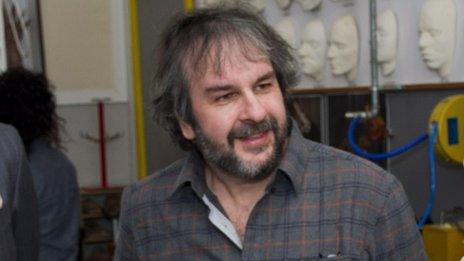The Hobbit producers deny animal mistreatment claims
- Published

Oscar-winning director Peter Jackson and the producers of The Hobbit films have rejected allegations that animals died on set due to mistreatment.
Animal rights group Peta has claimed that up to 27 animals, including horses, sheep, goats and chickens, died during filming in New Zealand.
The group has planned protests at the first film's forthcoming premieres.
Jackson and his team said in a statement that "no animals died or were harmed on set during filming".
The Hobbit: An Unexpected Journey will debut in Wellington next week ahead of premieres in the US and the UK.
Peta said it wanted to send "a clear message to Hollywood", adding that it was important to make movie-goers aware of the claims.
The group alleged that most of the deaths took place at farms and stables where the animals were housed, and not while cameras where rolling.
The film's producers said they "completely reject[ed] the accusations", stating that the American Humane Association (AHA) had monitored all use of animals during the shoot.
The film of The Hobbit has also been criticised by animal rights groups over claims that up to 27 animals used during production died through alleged neglect
"Extraordinary measures were taken to make sure that animals were not used during action sequences or any other sequence that might create undue stress for the animals involved," they continued.
Jackson and producers said that more than half of the shots featuring animals in the three new Hobbit films, which were shot back to back, were computer-generated.
Some "wranglers" involved in the project had reported that two horses died from broken necks after being forced off steep embankments by other animals in their paddocks.
The producers said the employees in question had been fired more than a year ago.
Lisa Lange's, Peta's US senior vice president, claimed that sheep and goats had died from contracting worms and falling into sinkholes in rugged terrain.
She also said a dozen chickens had been mauled to death by dogs.
"This production's decision to use numerous live animals and allow them to suffer needlessly takes the entertainment industry a giant and disgraceful step backwards," said Lange in a statement.
Peta spokeswoman Claire Fryer said that a misbehaving horse was also left on the ground on a location shoot for three hours with its legs tied together, suffering rope burns that were later covered with make-up during filming.
"We regret that some of these accusations by wranglers who were dismissed from the film over a year ago are only now being brought to our attention," said The Hobbit producers.
They went on to claim they took took animal welfare seriously and had sought the highest level of care for those used in the films.
The first of the three films, The Hobbit: An Unexpected Journey, is released worldwide in December.
Meanwhile, the estate of author JRR Tolkien - author The Hobbit and the Lord of the Rings books - has begun an $80 million (£50.3m) legal action against film company Warner Bros over a branded online slot machine.
Legal papers, seen by industry publication The Hollywood Reporter, have been filed by the Tolkien estate and book publisher Harper Collins at a court in Los Angeles.
They argue that the film company had overstepped its merchandising rights by bringing out "highly offensive" digital items.
The Tolkien Estate said it breached a long-standing agreement enabling the studio to create only "tangible" merchandise based on the books, such as figurines, stationery items and clothing.
In a statement to Deadline Hollywood, it claimed: "Not only are gambling services outside the rights granted, but this exploitation of Tolkien's well-loved work has offended and distressed Tolkien's devoted fans, harming Tolkien's legacy and reputation."
- Published14 November 2012
- Published8 November 2012
- Published8 October 2012